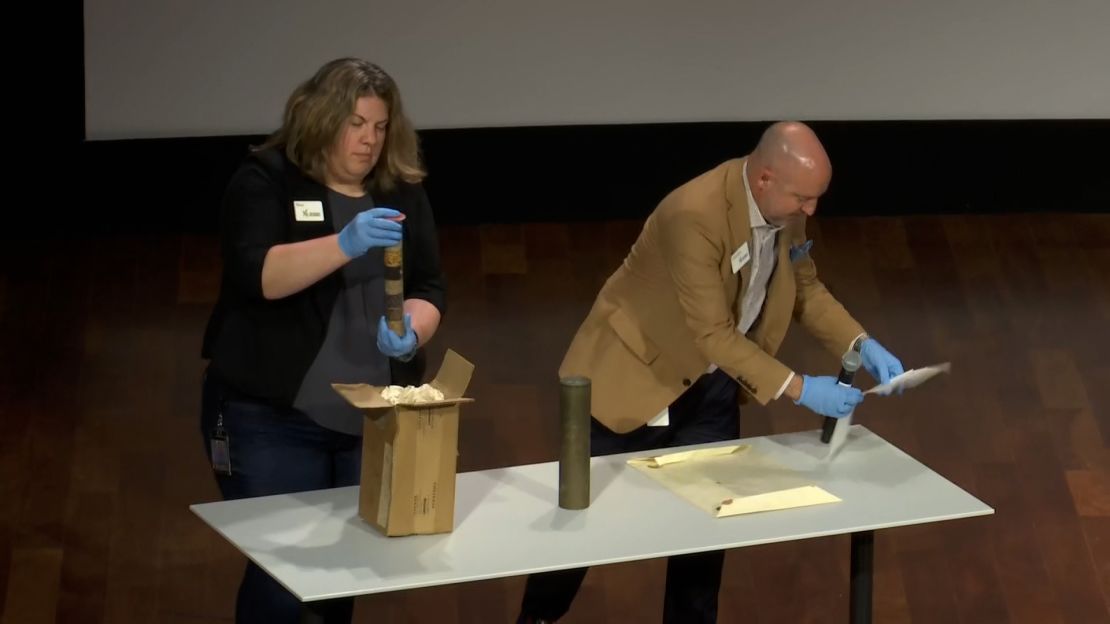The National WWI Museum and Memorial in Kansas City, Missouri, on Wednesday showed off an excavated century-old time capsule, revealing a cornucopia of early 20th-century relics, artifacts and documents.
In 1924, historians and museum curators banded together to bury a time capsule inside the Liberty Memorial, to be opened in 100 years. The items celebrated victory in World War I and provided a glimpse of life at that time.
In the 1920s, a group of prominent Kansas City residents formed the Liberty Memorial Association to construct a memorial dedicated to honor those who served in World War I.
At the time, the association hosted a ceremony to lay the cornerstone during the construction of the Liberty Memorial. About 100,000 people gathered as airplanes circled overhead, doves were released and patriotic music ringed through the ears of attendees.
The time capsule was placed deep within the limestone concrete interior of the Liberty Memorial Tower. Now, 100 years later, the museum hosted a ceremony to detail what was placed inside. The capsule had been retrieved this summer.
“So here we are, as they had planned 100 years later to open this capsule. Isn’t that great; who’d have thought that we’d be here,” said Matthew Naylor, the president and CEO of the museum.
A complicated retrieval process
Unearthing the capsule was not an easy feat for museum curators and staff, according to Christopher Warren, chief curator at the National WWI Museum and Memorial.
Workers had to drill inside the Liberty Memorial Tower’s wall to retrieve the capsule. In addition, the capsule was not in the same location as anticipated, which required the museum’s facility engineer to probe through 18 inches of thick limestone and concrete to locate it.
The staff ran into another problem with the retrieval. Curation staff were aware of potentially flammable nitrate film from the 1920s that was stored inside the capsule.
Naylor announced toward the beginning of the ceremony that the museum had an official list of the contents of the capsule which allowed them to determine the film was made with nitrate.
Staff feared the film would combust when it came into contact with oxygen if it were not stored properly. With the help of the Kansas City Police Department bomb and arson unit, the capsule was successfully opened with no explosions.
The capsule was opened prior to the unveiling ceremony Wednesday to evaluate the condition of the objects inside. Fortunately, the contents were preserved and nothing was damaged from water or mold.
Century-old relics unveiled
Museum curators and staff spent eight hours meticulously opening the interior packages using tweezers and small razor blades to preserve the contents of the artifacts inside as well as the packaging.
Warren said inside were newspapers, a copy of the Constitution, a Bible and a copy of the American declaration of war from April 1917.

Three objects were left to be opened live at the unveiling ceremony by museum curation staff. The packed audience included students from surrounding schools.
The first of these artifacts was a tube of seeds representing the Kansas City agricultural community.
A tube of letters was the next exhibit unveiled, consisting of congratulatory statements from Allied war commanders present for the 1921 groundbreaking for the Liberty Memorial. Another letter was penned by President Calvin Coolidge.
The final object is a printing plate from the Kansas City Star dated to November 1, 1921. The headline that day detailed 60,0000 people marching along a three-mile parade route.
Capsule had a host of signatures
What proved to be unique to Warren and museum staff were signatures engraved on the inside of the copper box. The museum thoroughly performed research into the identities of the individuals and did not discover who they were.
They concluded, however, that the signatures corresponded to people involved in constructing the time capsule.
“What?this?shows?is?that?it?wasn’t?just?the?committee?that?were?putting?together?the?objects?for?the?time?capsule,” Warren said.
“It was the whole community, the workers who were actually constructing the time capsule and welding the lid on the top of it itself that wanted to be involved in this celebration.”
